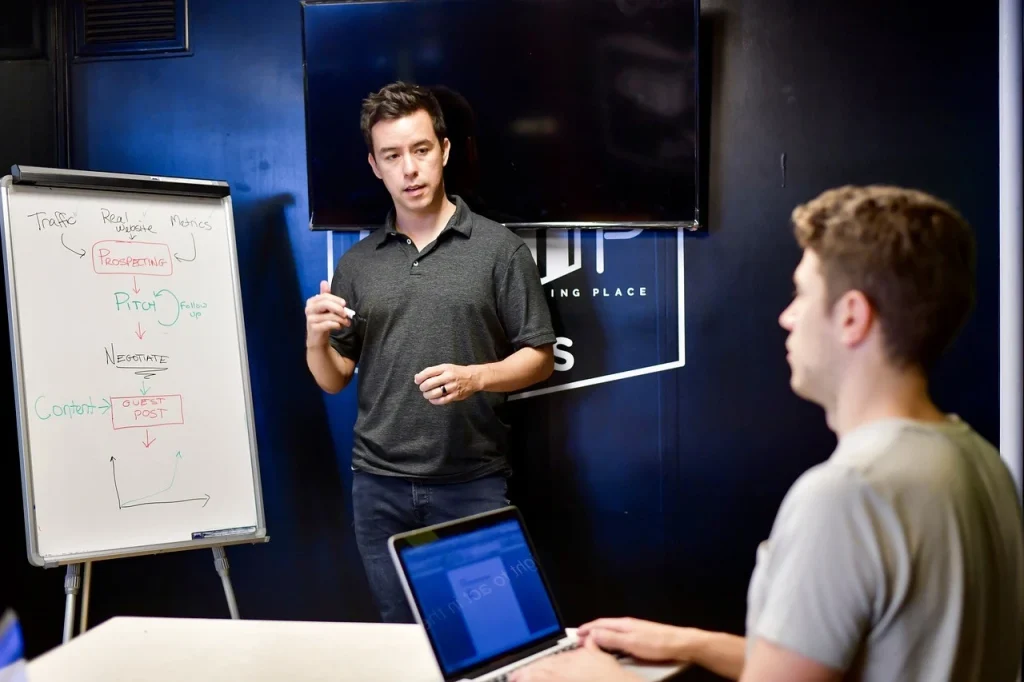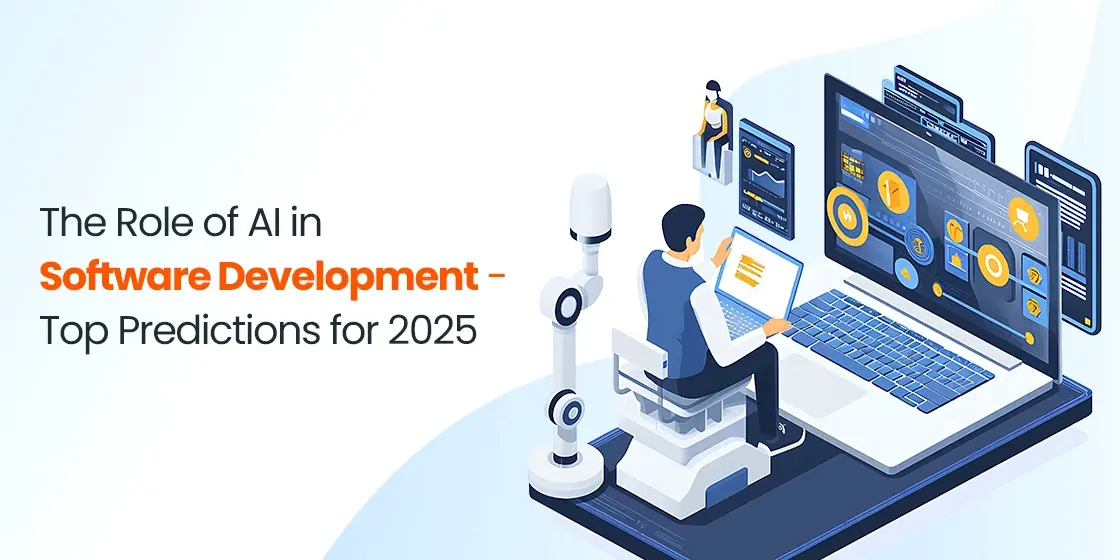Table of Content
Discover What Role AI is Going to Play in the Future of Software Development
The intersection of artificial intelligence (AI) and software development has been a rapidly evolving landscape over the past decade. As AI technologies continue to advance at an unprecedented pace, especially post-COVID, their impact on the software development process is becoming increasingly apparent. The year 2025 is looking to be a pivotal moment in this evolution, with AI-driven tools and techniques on the brink of revolutionizing how software is developed, maintained, and delivered.
One of the most pressing questions surrounding the role of AI in software development is whether it will ultimately replace human developers altogether. While AI has the potential to automate many tasks traditionally performed by developers, it’s important to recognize that its capabilities are still quite limited. AI excels at specific tasks, such as analyzing large datasets, identifying patterns, and generating code based on predefined rules. However, it lacks the creativity, problem-solving skills, and domain expertise that are essential for developing complex software systems from scratch.
In reality, AI is more likely to augment rather than replace human developers. Moreover, AI can help bridge the skills gap in the software development industry by providing tools and resources that can assist developers in learning new technologies and techniques. So, join us as we explore the capabilities of AI in software development, and discover what the future holds for custom software development services.
First Things First – Will AI Truly Replace Software Developers in 2025?

One of the most pressing questions surrounding the rise of AI is whether it will eventually replace human software developers. While AI has the potential to automate many aspects of software development, it is unlikely that it will eliminate completely the need for human expertise in the foreseeable future.
So, the short answer is no, AI will not replace human software developers in 2025 or anytime soon. While AI has made significant strides in recent years, it still lacks the ability to replicate the cognitive abilities of human developers fully. AI systems are excellent at performing specific tasks, such as analyzing data, generating code, and testing software. However, they struggle with tasks that require creativity, problem-solving, and critical thinking.
Human developers bring a unique set of skills to the table that AI simply cannot match. They have the ability to understand complex business requirements, design innovative solutions, and adapt to changing circumstances. They can also leverage their domain expertise to make informed decisions and solve challenging problems. In fact, it is the same argument as that of the role of AI in product development.
As we mentioned earlier, instead of replacing human developers, the role of AI is more likely that of augmenting their capabilities. And it will do so by automating repetitive tasks and providing insights that can help them make better decisions. This will allow developers to focus on more strategic and creative aspects of their work, such as designing new software features and solving complex technical challenges. This can lead to increased productivity, improved software quality, and faster time-to-market.
Today, AI is still under development and has limitations in terms of its ability to understand context, reason logically, and adapt to new situations. Moreover, human developers are essential for ensuring that software is not only functional but also ethical, bias-free, secure, and user-friendly.
Fuel innovation by leveraging bespoke software solutions. Get in touch with our team of experts to build cutting-edge software products.
Get a QuoteBenefits of AI for Software Development
The reason why the debate about the role of AI in software development is because of the alleged benefits it offers for the industry. And, the truth is that it’s true. The integration of AI into software development processes offers numerous benefits, including:
- Increased productivity: By automating routine and repetitive tasks, AI can free up developers to focus on more strategic and creative aspects of their work. This can lead to increased productivity and faster time-to-market.
- Improved quality: AI can help to identify and fix bugs and errors in software code, leading to higher quality products. Additionally, AI can be used to test software more thoroughly, ensuring that it meets the desired performance and reliability standards.
- Enhanced efficiency: By automating repetitive tasks, AI can help developers work more efficiently and boost productivity of the software development environment. This can lead to faster development cycles and reduced costs.
- Enhanced decision-making: AI can provide valuable insights and recommendations based on data analysis, enabling developers to make more, better-informed decisions.
- Improved innovation: AI can help developers to explore new ideas and come up with innovative solutions to complex problems. For example, AI can be used to test new code patterns or new software architectures.
- Reduced costs: By automating certain routine or redundant tasks, AI can help reduce the overall cost of software development.
- Reduced risk: AI can help to reduce the risk of software failures by identifying and mitigating potential vulnerabilities. Additionally, AI can be used to automate security testing, ensuring that software is protected against cyber threats.
Limitations of AI That Requires Experienced Software Developers
Despite its many benefits, AI has its limitations, just like any other technology. And those limitations limit the standalone role of AI in software development, necessitating the continued involvement of experienced software developers. They include:
- Lack of creativity: AI is not yet capable of coming up with truly original ideas or innovative solutions. It can only generate new code based on patterns it has observed in the past.
- Limited understanding of context: AI systems can struggle to understand the context and nuances of a given problem, which can lead to suboptimal solutions.
- Risk of Bias: AI systems can be biased or discriminatory if not developed and used ethically, which can lead to unfair or discriminatory outcomes.
- Technical challenges: Integrating AI into existing software development processes can be complex and time-consuming. Moreover, in terms of generative AI, your resultant code will often by as good as your query, meaning you would need training in prompt engineering for software development.
- Need for human oversight: AI systems must be monitored and maintained by human developers to ensure that they are functioning correctly and producing accurate results.
- Dependency on data quality: The quality of the data used to train AI models is critical to their performance. If the data is biased or inaccurate, the AI system will produce biased or inaccurate results.
- Ethical considerations: The use of AI in software development raises many ethical concerns, such as the potential for job displacement and the risk of skewed algorithms.
Top Trends and the Role of AI in Software Development in 2025 and Beyond

Several key trends are shaping the landscape of software development in 2025 and beyond, and AI is playing a central role in driving these advancements. Some of the most notable trends about the role of AI in software development include AI, such as the rise of AI TRiSM for AI governance as one of the top tech trends in 2025 according to Gartner.
Let’s take a look at some of the more important roles for AI in software development in the upcoming years.
Code Summarization and Documentation
AI-powered tools can automatically generate summaries and documentation for code, improving readability and maintainability. That makes it easier for developers to understand and maintain complex software systems. This can be particularly beneficial for large, legacy systems that have been difficult to document manually.
Streamlining Routine Coding Activities
AI can automate routine coding activities, such as generating boilerplate code, refactoring code, and fixing common errors. This can significantly improve developer productivity and reduce the risk of human error.
Bug and Error Identification
AI-powered tools can analyze code for potential bugs and errors, helping developers identify and fix issues more efficiently. By analyzing code patterns and comparing them to known vulnerabilities, AI can help developers identify potential problems before they become serious issues.
Project Planning and Resource Allocation
Artificial intelligence can assist with project planning and resource allocation by analyzing historical data and predicting future trends. In fact, there is a great argument to be made about how AI transforms business forecasting better than physical analysts do. This can help organizations optimize their development processes and ensure that they have the resources they need to meet their goals.
Role of AI in Software Development – Assessing and Mitigating Risks

As AI continues to play a more prominent role in software development, it is essential to assess and mitigate the potential risks associated with its use. These risks include the following.
- Bias: AI algorithms can be biased if they are trained on biased data. This can lead to discriminatory or unfair outcomes.
- Security vulnerabilities: The use of AI in software development raises security concerns, such as the risk of AI being used to develop malicious software.
- Job displacement: There is a concern that AI could lead to job displacement for software developers. However, it is more likely that AI will augment the capabilities of human developers, rather than replacing them entirely.
To mitigate these risks, it is important for organizations to adopt responsible AI practices. This includes ensuring that AI systems are developed and used ethically, and that they are transparent and accountable. Additionally, organizations should invest in training and education to help their employees understand the potential benefits and risks of AI. These responsible AI practices are:
- Ethical development: Ensuring that AI systems are developed and used ethically.
- Data quality: Ensuring that the data used to train AI systems is accurate and unbiased.
- Security measures: Implementing robust security measures to protect AI systems from attacks.
- Skill development: Investing in the development of skills that complement AI, such as critical thinking, problem solving, and creativity.
Tech Leaders and Their Role in Accepting AI for Software Development

Tech leaders have a crucial role to play in embracing AI for software development. They are the driving force behind the adoption of new technologies in the industry, meaning that their opinions color the perception of players in the industry. Therefore, in order for the role of AI in software development to expand, these tech leaders need to challenge a few perceptions, and step up in a few different ways.
Accept that Artificial Intelligence is Here to Stay
AI is a transformative technology that will continue to shape the software development landscape. They must recognize that AI is a helping technology that will have a profound impact on the software development industry.
Assess the Feasibility of Investing Custom AI Models for Your Business Needs
Consider the pros and cons for developing custom vs proprietary AI models for your organization’s operations and workflows. Tech leaders should also carefully evaluate the potential benefits and costs of investing in custom AI models for their specific business needs.
Look Into Adopting Low-Code/No-Code Solutions
Low-code/no-code platforms can make it easier for organizations to develop and deploy AI applications. Tech leaders should explore low-code application development and consider whether it is a good fit for their business.
Understand That AI Isn’t a Solution to Everything – Human Developers are a Necessity Too
AI is a powerful tool, but it is not a magic bullet. Human developers are still essential for developing high-quality software. Tech leaders need to understand that AI and human developers need to work together to achieve the best results.
FAQs
| Can AI be used in software development? In its current form, there are a number of limitations and issues that make experts suggest avoiding relying on AI completely for software development. However, AI can still help you simplify and streamline the process for a higher success rate. |
| What is the role of AI in software development right now? Currently, AI is often used by software development teams to automate testing operations, improve natural language comprehension and parsing, data analytics, and similar supplemental activities. |
Conclusion
The role of AI in software development is rapidly evolving, and the potential benefits are immense. By embracing AI and addressing its limitations, organizations can streamline their development processes, improve the quality of their software, and drive innovation.
However, it is essential to approach this integration with a balanced perspective, recognizing the importance of human expertise and the need for responsible AI practices. As we look ahead to 2025 and beyond, the future of software development is poised to be shaped by the powerful synergy between human ingenuity and artificial intelligence.
Empower your digital initiatives with BariTechSol, a premier custom software development company. Our skilled team tailors cutting-edge solutions to your unique needs. Elevate your tech experience and stay ahead in the digital realm. Partner with BaritechSol and code the success of your next big idea.


